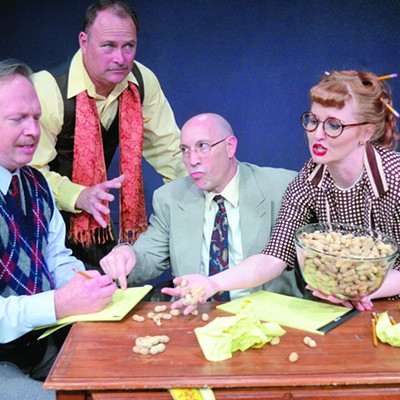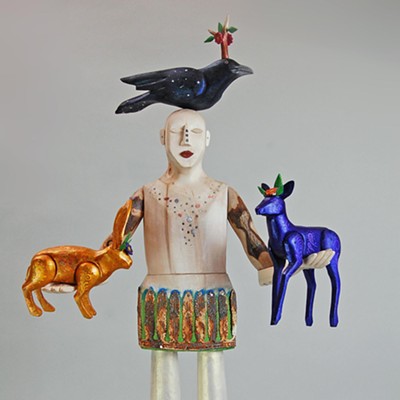Amateur art-photographer Williamson was inspired to make a series of reverent photos of the tuber after she found it, just like that, in an ordinary potato sack upon returning to Tucson from a trip to Ireland in 1996. She'd almost forgotten about that art project when it occurred to her that the image was the perfect bundle for a collection of songs she'd written about, as touted on her Web site, taking back "God, country ... (and country music!) from the evil-doers."
The Sacred Spud gathers and focuses her organic attack on the machines that dominate American culture. From the New York home which she has repaired to practice arts and entertainment law (and follow women's basketball at Madison Square Garden), she says, "Corporate Christianity is handmaiden to the military-industrial complex. ... It's a culture-creating machine: the generation of branding, the whole star-celebrity generation, where you have an artificial investment in advertising, a virtual creation in an identity such as celebrity or branding, but there isn't any substance anymore."
You may respond: "Oh, ick. A soapbox! I'd rather watch Celebrity Poker Showdown on the TiVo."
Point made, and taken, because for all of that, The Sacred Spud is also humorous (especially in the character development and plot twist of "She Was Playing Texas Hold 'Em"), self-effacing (as in "Don't Make a Scene, Kathleen," a warning perpetually falling on deaf ears) and ultimately oddly comforting. Williamson's empathy for her characters, cornered as they are by pop culture, is more than generous, and her "American Dream" actually celebrates the United States in terms of the diversity that she believes thrives here, especially in Tucson, as nowhere else in the world. Her set closer, "Thankful Way to Be," resolves her rage against the machine with a personal commitment to truth, simplicity and community.
"This is a post-Sept. 11 world," she notes, "and a lot of people today, of many different (generations), really are looking for a safe place, and where can we find a safe place when both the power structures and the anti-power structures are decentralized? Corporations are the power structures in the world now. That's the dominant paradigm, the new theology, the new governance."
She addresses that dilemma explicitly in "Lookin' for a Savior," a track which also features brilliant pedal steel highlights by the late Hal Rugg, a frequent collaborator.
"It reflects where my soul is today," she says. "It's a new world, looking for a safe and green and blue place to be, trying to open up to chance a little bit. It's a political perspective to say: I'm gonna find my religion deep inside of me. I'm gonna find my own personal religion instead of looking to some kind of corporate or structured religion."
Williamson considers that each Sacred Spud song is "someplace on a political spectrum," even the almost psychedelic "Diosa," a half-dream on a long night road, and "Keep It Faithful," which at first blush seems like a simple affirmation of commitment to a relationship.
"I think when you get into any integrity in any aspect of your life, you're starting to make a political choice, too," she says.
Sacred Spud's melodies and arrangements buttress Williamson's messages with identifiably American sounds. She concedes that her 2003 release, Love Is Best of All, was all over the globe stylistically. Because Sacred Spud's songs are about the state of America, she says, "This one, I tightened down more into an alt-country blues genre. It was really a conscious decision."








